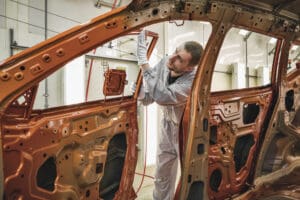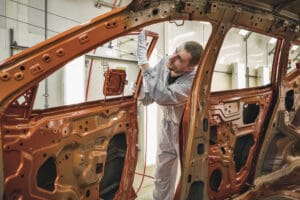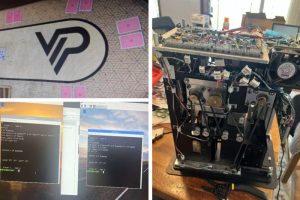UK car production plunges to lowest level since 1952 after Jaguar Land Rover cyber attack


Britain’s car manufacturing output has slumped to its lowest point in more than seven decades after a devastating cyber attack brought Jaguar Land Rover’s (JLR) assembly lines to a standstill for more than a month.
According to new figures from the Society of Motor Manufacturers and Traders (SMMT), total UK vehicle production collapsed by 35.9 per cent in September, falling to just 54,319 units. Car production alone dropped 27.1 per cent to 51,090, with the industry body blaming the sharp decline almost entirely on JLR’s prolonged shutdown.
The SMMT described the incident as “unprecedented”, noting that other major manufacturers had reported growth during the same period.
JLR, owned by India’s Tata Motors, halted output on 31 August when hackers infiltrated its internal systems. The breach forced the company to suspend operations at plants including Solihull in the West Midlands and Halewood on Merseyside.
Thousands of employees were temporarily sent home as the company scrambled to contain the attack, while suppliers across Britain also faced weeks of disruption. Production has now restarted on a limited basis, but insiders say full capacity is unlikely to return until January 2026.
The Cyber Monitoring Centre estimates the attack could cost Britain almost £2 billion, making it the most expensive cyber incident in UK history. Analysts at S&P Global warned that JLR’s revenues could fall by up to 18 per cent this year, with around 50,000 vehicles lost and total sales now forecast at £24 billion — £3 billion less than previously expected.
The collapse in JLR output comes against a backdrop of wider uncertainty in the automotive sector. UK car production for the year so far has fallen 15.2 per cent to 582,250 units, highlighting persistent challenges from the shift to electric vehicles, rising input costs and supply chain fragility.
Mike Hawes, chief executive of the SMMT, said the September data “comes as no surprise given the total loss of production at Britain’s biggest automotive employer following a cyber incident”. He urged the government to maintain tax incentives and fleet benefit schemes that encourage businesses to offer new cars to employees.
“The industry needs stability and support,” Hawes said. “Removing these incentives now would cause severe and lasting damage to jobs and competitiveness.”
The attack on JLR has reignited debate over Britain’s preparedness for industrial cyber threats. Experts have warned that as factories become increasingly digitised and connected, the risk of large-scale disruption is growing exponentially.
With JLR still recovering and the broader sector facing a fragile transition to electric powertrains, industry leaders are calling for a coordinated approach to bolster cybersecurity across Britain’s manufacturing base.
Read more:
UK car production plunges to lowest level since 1952 after Jaguar Land Rover cyber attack








